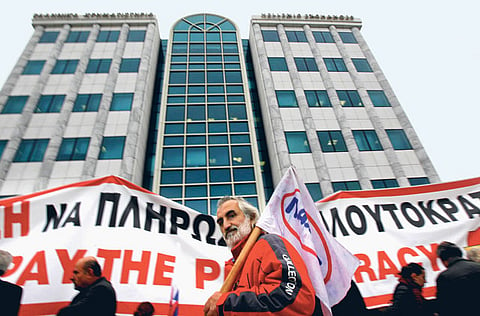Cautious markets dump Greek assets
Bond yield spreads hit record as scepticism grows over Athens' ability to repay

London: The premium investors demand to buy Greek debt rather than benchmark German Bunds surged to new highs yesterday as investors dumped Greek assets amid growing doubts over the country's ability to resolve its debt crisis.
The cost of protecting Greek government bonds against default also hit a new record, fuelled by concerns that Greece will be unable to fund 23 billion euros (Dh112.8 billion) of redemptions due in April and May.
"The market appears sceptical that they will be able to redeem that May bond," said Chris Clarke, analyst at ICAP.
The widening spread and renewed selloff in Greek assets brings the prospect of the European Union-International Monetary Fund safety net, agreed last month, closer to being called upon, analysts said.
"Even if the spread goes to 100 basis points [wider], it will not entice investors to buy Greek debt — I think we have gone beyond the point of no return," said KBC strategist Piet Lammens.
The selloff was also seen in Greek bank shares which fell by close to 7 per cent.
Adding to uncertainty in the market, the terms of the EU-IMF rescue deal and when it can be activated remain vague.
Resistance has surfaced at Germany's central bank over German involvement in the deal, a newspaper reported on Wednesday.
The European Central Bank's monthly meeting was yesterday scheduled to flesh out a revamp of its lending rules aimed at easing the financial pressure on Greece.
The Greek/German government 10-year bond yield spread widened to 461 basis points, up over 40 basis points on Wednesday's close.
Two-year Greek bond yields jumped to almost 8 per cent, up 121 basis points, the biggest one-day jump on record, according to Reuters.
The dramatic moves in bond yields were exacerbated by thin liquidity in the market, which caused bid-offer spreads to soar.
"It's a bit of a pain selling in a very, very thin illiquid market, you can't get anything done," said a bond trader in London.
Greek credit default swap prices rose to 448,500 euros per 10 million euros of exposure, up from 413,000 euros at Wednesday's New York close, surpassing a previous record reached in early February.
On Wednesday, Greek banks asked for access to the remaining part of a 28 billion euro state support package.
Analysts, citing ECB and national central bank data, say Greek banks have in relative terms been one of the main users of the European Central Bank's liquidity operations, having found other sources of funding drying up.
Credit woes
Greek repo markets, for example, have been all but paralysed since the start of the year as lenders withdrew or slashed credit lines. At 9.49am GMT, the Bund future was at 123.44, up 33 ticks up from the settlement close.
The 10-year German bond yield was 3.094 percent, around 0.7 basis points lower, while the two-year Schatz yield was down 2 basis points at 0.927 per cent.
Rising US Treasury prices lent early support to Bunds after record demand at a $21 billion auction of 10-year notes allayed concerns over flagging demand for government bonds.


